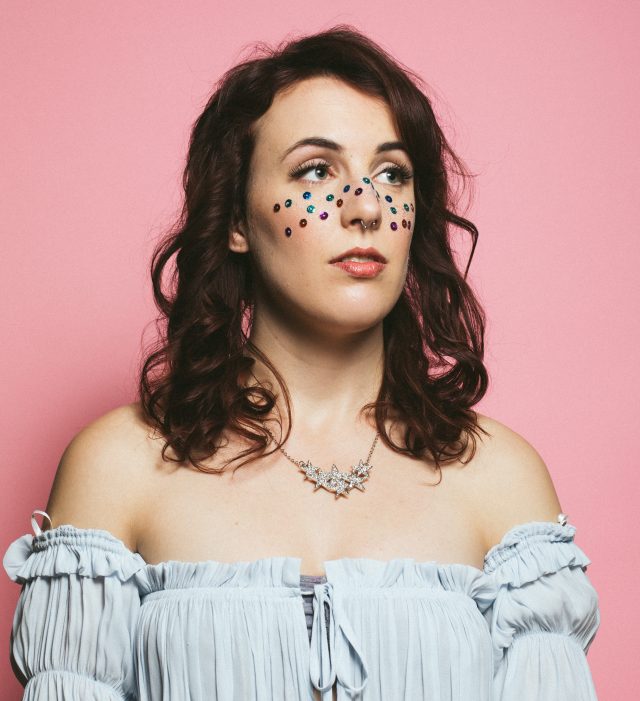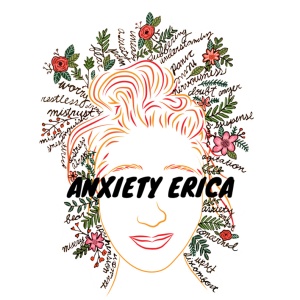Growing up in a family with mental illness, Sarah was no stranger to suffering. Living with anxiety, panic attacks and insomnia since she was just four years old, she didn’t reach out and get help until the intense hypomania of her undiagnosed bipolar disorder took a dark turn.
Trading in her straight-A student role for an out of control musician, this creative soul eventually realized that medication would save her life. Not just surviving, Sarah is thriving through bipolar disorder. Writing music around mental health, performing at high schools to educate teens, and even practicing aerial yoga, these fantastic forms of self care have kept her going, while helping others heal as well.
Meet Sarah.

Name: Sarah Jickling
Age: 26
Explain the origin of your mental health issues i.e., what is your mental health issue, how did you realize what was happening, how was it affecting your everyday life at the time?
I’ve had anxiety, panic attacks and insomnia for as long as I can remember. I come from a family with mental illness on both sides, and I grew up watching grown ups struggle, panic, and lose control, so I thought my experiences were just par for the course. When I was four, I slept with a fisher price knife under my pillow because I was scared someone would crawl through my window. When I was eight, my parents gave up trying to find a way to help me sleep after exhausting all their resources. When I was fourteen, I had one of my panic attacks, the one where suddenly everything is in slow motion and I forget basic motor skills, during a french class and failed a test for the first time. No one seemed to think any of this was out of the ordinary, and I never went to the school counsellor because none of the teachers even knew my name. I was too quiet.
But the quiet was about to end. In my late teens and early twenties, I went from a shy straight A student with an artistic side to a university-drop out musician who drank wine on the bus and had screaming matches in the streets. I felt completely out of control. One day I would feel excited, and feel sure that I was in the right place at the right time and it was only a matter of time before I would be opening for Feist on the big stage at a festival, and then I would wake up a few days later feeling heavy, feeling empty, and for the first time, suicidal. I would go to band practice and lie on the floor in tears. Everyone realized something was happening before I did. My behaviour pushed away my best friend, every boyfriend I had, my bandmates, and my roommates. People begged me to get help. People told me that I was broken and I needed to be fixed or no one would ever want anything to do with me. This was bipolar disorder, a new beast that was harder to ignore than anxiety and panic attacks.
What was the resounding moment when you decided to get help? What made you do it?
The thing about bipolar disorder is that it can seem like so many different illnesses depending on when you go to the doctor. The first time I decided to get help was when my best friend told me she wouldn’t be my friend unless I went on medication. I went to my family doctor who promptly diagnosed me with depression and put me on a waitlist to see a psychiatrist. But of course, soon I felt better, I felt like I didn’t need a doctor and I couldn’t imagine why I thought I ever did, and I would cancel the appointment. The second time I went to the doctor, I was diagnosed with bipolar disorder type 2. I rejected this diagnosis because I knew I was “crazy,” and I really didn’t want my ex-boyfriend to be right. Bipolar was something people had been teasing me about for quite some time.
The third time I was diagnosed with bipolar disorder, I found myself at the hospital on boxing day, a week after my soulmate told me he couldn’t watch me suffer anymore. The doctor spent some time tracking my moods and finally asked me if I had ever “heard of bipolar disorder before,” worried she would scare me away with that big word. By that time, I had done enough research and read enough books to know that I had bipolar disorder. I accepted the diagnosis without a second thought. The doctor said that treating the bipolar might take away my ability to write songs, and that a lot of people miss the creativity of hypomania when they go on medication. I didn’t care about being a musician anymore. I didn’t care about anything but getting better.
How does it affect your everyday life now? Challenges? What skills have you learned to cope?
It’s true that medication changes the creative process for people with bipolar disorder. Before my recovery, I would black out and wake up with a song. It was the only easy thing in my life. But bipolar doesn’t provide me with my creativity. Hypomania provides artists with a chance to write without our inner critic. I’m now learning to write songs thoughtfully, with extreme focus. It’s harder, but not impossible.
My medication has completely stabilized me, but it does have it’s unfortunate side effects. I sleep a lot. I am constantly dehydrated. I can’t drink alcohol anymore. And of course, the unexplained ecstasy of hypomania is gone from my life forever. But I can have a steady job, a real relationship and a working memory, so I think it’s worth it. My life is still all about coping with bipolar, anxiety and panic attacks though. I exercise every single day, I take mindfulness classes, I go to DBT groups, I see my therapist and my psychiatrist often. I put my mental health before any job or other responsibility. I think back to a time not so long ago when I was overdosing, praying I would never wake up, and I remember that vigilant self care is the only thing that has kept me from returning to those life or death situations.
I also write music about my mental illness and share them with others. I’m lucky to have an outlet, and I’ve found a community of artists also dealing with mental illness who help inspire me to keep going.
How has living with this mental illness benefited your life? What has it given you?
Living with anxiety has forced me to learn how to rationally face my fears. When your fears are every where, you can’t help but bump into them at every turn. Now I feel as though I can do almost anything, whether that be travel to a different country or play on a stage to thousands of people. Learning to treat my anxiety has introduced me to all sorts of fantastic coping mechanisms… from mindfulness to aerial yoga to pole dancing!
Living with bipolar disorder, on the other hand, has given me an ability to help other people. I have learned to live with a severe mental illness and now I get to help others, whether that’s through releasing my new album “When I Get Better,” or performing at high schools with the BC Schizophrenia Society’s musical/educational show “Reach Out Psychosis.” It’s also a great way to weed out fickle friends. If you have friends who will stick with you through bipolar treatment, you have very good friends.
What is one piece of advice you would give yourself when you were struggling the most with your mental illness?
You are worth loving, even with your mental illnesses. Anyone who tells you otherwise is wrong and should be forgotten immediately.
Are you a work in progress? Share your story in the comments below and you may be featured on the blog!

